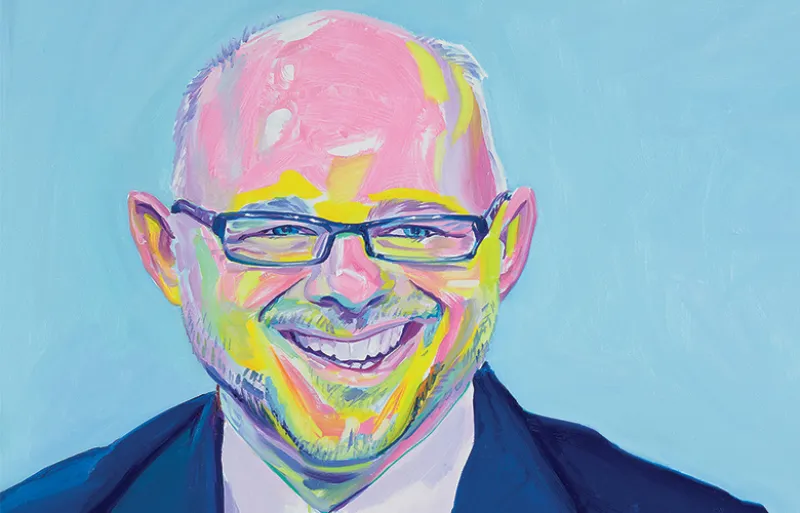Hans Humes is running late for our lunch in Manhattan. The Ethiopian restaurant Meske isn’t open yet, so I take a seat outside, next door at the Mexican cafe Añejo, and order a tamarind soda. When Humes zips up on a Citi Bike — wearing cuffed gray slacks and a navy-blue sports coat — we decide to skip the African cuisine and stick with Mexican.
Either one would pass for comfort food for Humes, the chairman and chief executive officer of Greylock Capital Management. His job, investing in distressed debt in emerging markets for the $1.2 billion hedge fund, is informed by a childhood lived around the globe. The 53-year-old CEO spent his early years in Nigeria, where his father, an American of Scots-Irish origin, taught local government at the University of Ife. Humes and his family then moved to Morocco. (His mother is Dutch and immigrated to the U.S. after World War II.)
Humes, who now lives in Brooklyn, says the food of West Africa — “chicken, rice, and lots of black pepper” — is closest to his heart. “We moved there when I was three, when I first started having memories. There’s a sense of being at home there,” he says.
But West African restaurants are virtually nonexistent in New York City, which is why Humes had chosen an Ethiopian restaurant in Hell’s Kitchen for our meeting. Coincidentally, the Mexican food next door referenced another country where he had lived — this time as a teenager, before he attended college and began a career in finance, working on the sovereign risk desk at now-defunct Manufacturers Hanover Trust Co. in the early 1980s. “They called it ‘third world’ debt back then,” he says, remembering how strange the description had seemed to him, an American who had considered Mexico and Africa home.
Ethnic food was the pretext for lunch, but what I really wanted to know was how a globalist like Humes views the new era of U.S. isolationism — and what the companies and clients Greylock Capital works with in Africa, Latin America, and Europe are thinking about President Donald Trump’s policies.
“There’s a sense of amusement,” he says, particularly from those in emerging markets. “They are like, ‘See, this is what it’s like,’” referring to their history with dysfunctional and autocratic governments.
As for the Africans, they no longer have “Big Brother” to guide them, and the Europeans realize “they’re on their own,” the Greylock Capital CEO adds.
Humes, who says most of his friends (not to mention his Chinese wife) were not born in the U.S., has a bleak but matter-of-fact view of the role Americans will have on the global stage. “Trump is just accelerating the decline of the U.S.; it was happening anyway,” he says.
Humes was as surprised as most Americans by the results of the November 2016 presidential election. Trump beat Democratic candidate Hillary Clinton despite having no government experience. He rode to victory by tapping into a populist fervor that helped him win the electoral college even as he lost the popular vote. In his campaign to become president, the reality television star and real estate mogul invigorated supporters with his vow to build a wall between Mexico and the U.S., and to make Mexicans pay for it.
When Humes was in Mexico last year to deliver the keynote speech at Instituto VIF’s annual value investing forum, remarks made by former Mexican President Vicente Fox in opposition to Trump’s border plan were still reverberating: “I’m not going to pay for that f***ing wall,” he had said during a February 2016 interview with Univision and Fusion anchor Jorge Ramos.
When it came time to take questions from the audience after his speech, Humes recalls, the first one was about Trump.
“So I go out on a limb: ‘Maybe this guy gets the nomination. No way he can win,’” recounts Humes, a Democratic Party donor who had supported Clinton. In December the man who had organized the conference dropped by the Greylock Capital office and reminded him of his election prediction. For Humes the outcome was so upsetting he had to drag himself out of bed for days. He briefly considered moving back to Canada, where his family had relocated from Africa when he was in third grade. But Humes says he decided to “stay and fight.”
While keeping his home in Brooklyn, the hedge fund manager seems like a global tour guide for the adventurous, hitting the hot spots like Cuba and Iran before they become popular with American tourists. After a visit two years ago, Humes was looking forward to investing in Iran, but had to cancel plans for a second trip to the country in August because of the political climate. “I wanted to go back with this guy who is working on privatization, just to go in and talk to [the Iranians], just to get chits,” he says. “When and if it happens, I’ll have an inside track.”
The political dynamic has changed since President Trump decertified the Iran nuclear deal, leaving Congress to decide whether to reimpose sanctions on the country. Even before the decertification, though, it was Trump’s anti-Iran posture that kept Humes from returning — his contacts told him it had become riskier for Americans to visit the country.
“My takeaway sense on Iran is that it may take five to ten years, but they will reintegrate into the global economy,” he says. “Businesswise there are some obvious opportunities, but we just can’t get involved in any way.”
Meanwhile, the Europeans are seeking investment opportunties in Iran despite Trump’s stance on the country, according to Humes. “We can do whatever we want, but it’s not going to change the dynamic,” he notes. “It just means we’re going to lose out on that export market.”
For Greylock there are other opportunities. Humes is watching for the next big debt restructuring, which he thinks will be Venezuela. The New York–based firm owns the South American country’s distressed bonds.
As for the other side of the planet, Humes’s wife, Ying Miao, has taught Humes about the Far East. She moved to the U.S. in the wake of the 1989 Tiananmen Square uprising in Beijing — protests, led by students against the communist government, that ended in deadly clashes with Chinese troops. Her father, a reformer, sent his wife and only child to safety in the U.S., joining them later. Ying, who trained as a classical pianist, graduated from Harvard University and eventually moved into finance; she now works at Anheuser-Busch InBev.
Through Ying, who is expecting what will be Humes’s fourth child in November (he has three from his first marriage), Humes has developed a taste for Chinese cuisine. That’s fortunate for him. “When her parents found out she was pregnant, they had to make sure she had the right food,” he says. “So a Chinese cook comes in three times a week and makes Sichuan and Hunan fare.”
That suits Humes just fine. “It’s hot,” he says. Plus, although it’s comfort food to Ying, Humes says it reminds him of Africa and Mexico: “It’s all rice, all the time.”







